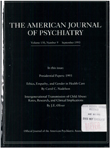Wisconsin Card Sorting Test performance in schizophrenia: remediation of a stubborn deficit
Abstract
OBJECTIVE: Schizophrenic patients typically perform poorly on the Wisconsin Card Sorting Test, which is a putative index of prefrontal functioning. The authors attempted to remediate the deficits of schizophrenic patients on this measure by giving detailed instructions and monetary reinforcement. METHOD: Forty-six inpatients with chronic schizophrenia and 20 control subjects with other psychiatric illnesses were given the Wisconsin Card Sorting Test under four conditions that varied in monetary reinforcement and level of instructions. The schizophrenic patients were given the Brief Psychiatric Rating Scale (BPRS) and three information processing measures (the Continuous Performance Test, Span of Apprehension, and Pin Test). RESULTS: Schizophrenic patients performed worse than psychiatric control subjects across most conditions. Monetary reinforcement had little effect on performance, but detailed instructions significantly improved the scores for both groups. When instructions were withdrawn and monetary reinforcement was maintained, both groups continued to show improved performance over baseline. Symptoms were not significantly associated with Wisconsin Card Sorting Test performance. One measure (the Pin Test) correlated significantly with performance on the Wisconsin Card Sorting Test. CONCLUSIONS: The results suggest the importance of combining motivational with instructional factors for training psychiatric patients in problem solving.
Access content
To read the fulltext, please use one of the options below to sign in or purchase access.- Personal login
- Institutional Login
- Sign in via OpenAthens
- Register for access
-
Please login/register if you wish to pair your device and check access availability.
Not a subscriber?
PsychiatryOnline subscription options offer access to the DSM-5 library, books, journals, CME, and patient resources. This all-in-one virtual library provides psychiatrists and mental health professionals with key resources for diagnosis, treatment, research, and professional development.
Need more help? PsychiatryOnline Customer Service may be reached by emailing [email protected] or by calling 800-368-5777 (in the U.S.) or 703-907-7322 (outside the U.S.).



